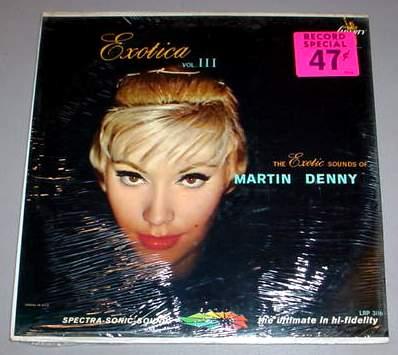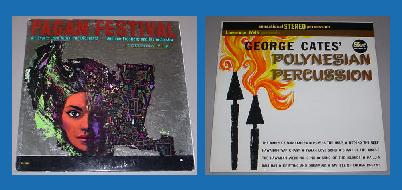Enter the Land of Exotica
Exotica was big. In fact, it was so big it had three rulers. Their names were Les Baxter, Martin Denny, and Arthur Lyman. The music they created was pure escapism, and it couldn’t have come at a more receptive time. In the Post World War II era people were ready to shed the austere life, and the more exotic the better. And so Exotica was born. In it you will find traces of Latin music, traditional island music (Hawaiian, Polynesian and Tahitian among others) along with some creative sound effects such as jungle birds that seemed to curiously eminate from the orchestra pit.

It’s not often you find a vintage Exotica album that has never been opened. But when you do, you know you have something collectible! Here is a sealed copy of Martin Denny's Exotica III released in 1959 on the Liberty Label. (Liberty LRP-3116)
In the music, there is adventure around every corner. The scenery is lush, the natives are restless but inviting, and you can experience it all in relative safety. I love it because it takes me to places I’ve never been, and probably never will be. International music comes in many forms, and one of my favorites is Exotica. I enjoy the contributions made by the three kings, but frankly some of their later releases were a little boring. Martin Denny may have taken the form too far when he recorded songs like MacArthur Park and My Funny Valentine. Personally, I prefer songs with titles like Primitiva, Voodoo Dreams and of course the classic Quiet Village. Who wants modern songs made exotic? I want exotic songs played exotically.
If you’ve never experienced Exotica, then by all means begin with the big three. But at this stage, what excites me is to find the more obscure releases of this genre. From time to time in this blog I intend to revisit this music with some examples of latecomers to the format. Two I especially enjoy are Dominic Frontiere and George Cates.

If you enjoy exploring uncharted regions of Exotica, these albums by Dominic Frontiere and George Cates will satisfy the angry gods within.
Dominic Frontiere was an experienced film soundtrack composer who didn’t mind borrowing from the styles of others, while still bringing a freshness of his own to the genre. (His Hang ‘em High was clearly inspired by Ennio Morricone, but then everyone who wrote music for Westerns in that era was in debt to the master.) Frontiere also composed the scores for On Any Sunday and Popi to name just a couple.
His album Pagan Festival: An Exotic Love Ritual for Orchestra (Columbia CL-1273) is a wonderful Exotica album that is perhaps a little more sophisticated than most. It is rich in orchestration and truly feels like a soundtrack. If Exotica feeds your desire to visit strange lands, then who better to transport you than someone experienced in the art of the instrumental as a storytelling vehicle? Frontiere takes you on a fabulous excursion to pay homage to the Jaguar God, and then its on to the Temple of Suicide and the Corn Festival. Side trips along the way include visits to meet the Moon Goddess and Venus Girl. And who could resist the House of Pleasure? Conjure that!
George Cates comes from a different background. I enjoy the suspicious looks when I explain Cates was a protégé of Lawrence Welk. In fact he wrote Welk’s signature song “Champagne Time” and did frequent arrangements for the orchestra. A Lawrence Welk Special airing on PBS revealed that while Cates was a taskmaster, he got the best out of his musicians. His album Polynesian Percussion (Dot DLP-25355) is clearly the work of a craftsman, and is appropriately full of fun and surprises. (And oh, by the way, I like Lawrence Welk.) The album features Cates' brother-in-law guitarist Alvino Rey, and drummer Buddy Cole. Songs like Moon of Manakoora and Hawaiian War Chant will lure you to an uncharted corner of Exotica.
When you enter this land, be ready to fight off jungle snakes, native spears, torrential rainfall, and the rages of unknown gods. This is music that has just about everything. OK, you can’t dance to it. That’s an added bonus.


0 Comments:
Post a Comment
<< Home